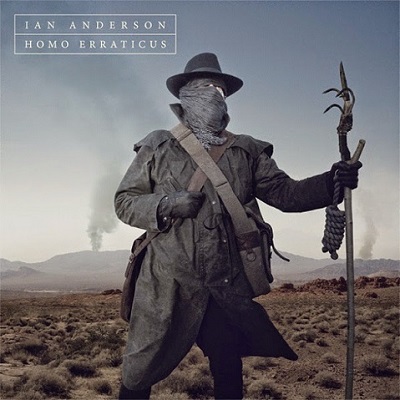Now that he’s firmly planted the Ian Anderson flag, the ever-prolific singer, flautist, songwriter and storyteller has followed up 2012’s Thick As A Brick 2 with an ambitious “Prog-Folk-Metal” conceptual piece called Homo Erraticus. Presented to Anderson by one Gerald Bostock, the main protagonist of Thick As A Brick, the story is based on an unpublished manuscript by amateur historian Ernest T. Parritt, who examines key events of British history with a string of prophecies that span the modern age and beyond, intertwined with a cast of personalities, each emerging from Parritt’s (or is it Bostock’s?) fertile imagination.
As Anderson explained it to me, the moral of the story is survival of the fittest and natural selection — or as he put it mildly without adhering to the perilous tenets of social Darwinism — the “search of the woolly mammoth.” There is a unique opportunity for Anderson to alter and filter his POV by spinning Parritt’s wild tales via Bostock’s mind — of which he takes great liberty. Parritt, assuming the identity of the nomadic Neolithic settler, staves the ravages and riches of “Doggerland,” before morphing into an Iron Age blacksmith for “Heavy Metals,” a light and easy stroll that is anything but heavy metal.
Really, the whole album assumes a rather airy, ethereal quality, striving for a slightly different flavouring than what you would get from a Jethro Tull record. But when you hear Anderson play the flute and sing in that familiar nasally, weathered tenor, and the tempo leaps and levitates…well, you can’t help but think this, like its predecessor, would have been an outstanding Jethro Tull album. And so it goes as Anderson and his band — Ryan O’Donnell (vocals), David Goodier (bass guitar), Scott Hammond (drums, percussion), John O’Hara (keyboards) and Florian Opahle (lead guitar) — jump headlong into the bristly plot, supported by a tight and cohesive unit that may or may not resemble Jethro Tull.
“Enter The Uninvited” is the centerpiece of Homo Erraticus as it rollicks from Roman legions to cocaine cola and Facebook, adrift over a steady meter and a very Tull-like break with Opahle servicing a more refined, somewhat thinner sound than that of Tull guitarist Martin Barre. It seems to suit the light accents spread throughout. O’Donnell, who startled longtime Tullians when he appeared during the TAAB 2 tour, acting and singing full verses of Jethro Tull songs, takes on a prominent role on “Meliora Sequamur (Let Us Follow Better Things),” harmonizing and taking a verse for himself. He’s also featured on the harder rockin’ “The Turnpike Inn.”
Between accordion, piano and organ, O’Hara carries the flow of the music while Anderson and Opahle jump in and out of the current, and Hammond and Goodier keep the time signatures in check and on the mark. “The Pax Britannica” gives way to the Prophecies portion of Homo Erraticus, which kicks off with a fierce flute bopping amidst the proggy meadow of “Tripudium Ad Bellum.” A more introspective approach accompanies the general tone that fills the measures of “After These Wars” and “New Blood, Old Veins” before the Revelations portion of the record exhort the gloom and doom we all face. “The Browning Of The Green” and its “we’ll be tight as canned sardine” refrain is old-school Tull in both its sonic weight and execution. The spoken passages that Anderson spews on “Per Errationes Ad Astra” segues comfortably into the album’s final track “Cold Dead Reckoning,” serving as the piece’s dénouement as it brings us back to Doggerland without a whole lot of prospects.
On its own terms, Homo Erraticus allows Ian Anderson to expand his palette beyond the expectations of Jethro Tull fans, while simultaneously staying true to himself and his style, which is virtually interchangeable with Jethro Tull. The songs, the very idea, the sheer lunacy of Anderson’s imagination still on fire and raging with quirkiness — these are the sort of elements that keep the music alive and captivating for both the artist and the audience.
~ Shawn Perry




















